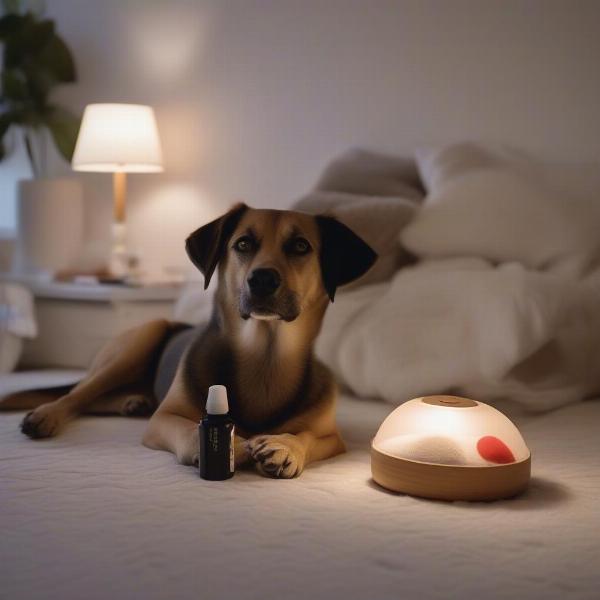Dog howling at night can be disruptive and concerning for owners. Why do dogs engage in this behavior? Understanding the reasons behind nighttime howling is crucial to addressing the issue effectively. This article explores the various causes, from underlying medical conditions to environmental triggers, and offers practical solutions to help you and your furry friend get a peaceful night’s sleep.
Why Does My Dog Howl at Night?
Several factors can contribute to a dog’s nocturnal howling. Loneliness and anxiety are common culprits, especially in dogs left alone for extended periods. They might howl as a way to express their distress and seek attention. External stimuli, such as sirens or other animals’ vocalizations, can also trigger howling. Some dogs are more sensitive to these sounds than others and might respond by howling along.
Medical conditions can also play a role. Pain or discomfort can cause a dog to howl, especially if it worsens at night. Cognitive decline in senior dogs can lead to increased vocalization, including howling. Lastly, certain breeds, like Huskies and hounds, are genetically predisposed to howling as a form of communication.
Addressing Nighttime Howling: Practical Tips
Identifying the root cause of your dog’s howling is the first step towards finding a solution. If you suspect a medical issue, consult a veterinarian. They can diagnose any underlying health problems and recommend appropriate treatment.
For anxiety-related howling, creating a comfortable and secure environment can be helpful. Provide a cozy bed, familiar toys, and a calming pheromone diffuser. Leaving a piece of your clothing with your scent can also provide comfort. Behavioral training techniques, such as desensitization and counter-conditioning, can help your dog learn to cope with triggers and reduce anxiety.
 Dog Howling at Night: Anxiety Solutions
Dog Howling at Night: Anxiety Solutions
Is It Always a Problem? Howling as Natural Behavior
While excessive howling can be a nuisance, it’s important to remember that howling is a natural canine behavior. It’s their way of communicating with other dogs, expressing their emotions, and responding to their environment. In some cases, a certain level of howling is normal and shouldn’t be a cause for concern. However, if the howling is frequent, disruptive, or accompanied by other behavioral changes, further investigation is warranted.
How to Stop Your Dog From Howling at Night: A Step-by-Step Guide
- Consult a veterinarian: Rule out any medical conditions that might be contributing to the howling.
- Create a calming environment: Provide a comfortable and secure space for your dog to sleep.
- Address anxiety: Consider using calming aids, such as pheromone diffusers or anxiety wraps.
- Behavioral training: Implement desensitization and counter-conditioning techniques to address triggers.
- Ignore the howling: Avoid giving your dog attention when it howls, as this can reinforce the behavior.
- Establish a routine: A consistent bedtime routine can help regulate your dog’s sleep cycle and reduce anxiety.
Conclusion
Dog howling at night can be a complex issue with various underlying causes. By understanding these reasons and implementing the right solutions, you can help your dog—and yourself—get a good night’s sleep. Remember to consult a veterinarian if you suspect a medical issue, and consider behavioral training if anxiety is a factor. Addressing the root cause is key to resolving nighttime howling and promoting a harmonious environment for both you and your furry companion.
FAQ
- Why is my dog suddenly howling at night? Sudden changes in howling behavior could indicate a medical issue, anxiety, or a change in the environment.
- Is it okay to ignore my dog’s howling? Ignoring the howling can be helpful if it’s attention-seeking behavior, but it’s crucial to rule out any underlying medical or emotional distress.
- How can I tell if my dog’s howling is due to pain? Look for other signs of discomfort, such as changes in appetite, limping, or whining.
- Are certain dog breeds more prone to howling? Yes, breeds like Huskies, Beagles, and Bloodhounds are known for their vocalizations, including howling.
- Can training help reduce my dog’s howling? Yes, behavioral training techniques can be very effective in addressing anxiety-related howling.
- What are some natural remedies for dog anxiety? Calming herbs, pheromone diffusers, and anxiety wraps can help soothe an anxious dog.
- Should I punish my dog for howling? Punishment is not recommended, as it can worsen anxiety and create fear.
why is my dog howling at night
dog is howling at night
moon dogs
why is my dog growling at nothing at night
ILM Dog is your trusted resource for expert advice on dog care and wellbeing. We offer guidance on dog breeds, health, training, nutrition, grooming, and more. Our team of experts is dedicated to providing you with the information and resources you need to be the best pet parent possible. For all your dog-related questions, reach out to us at [email protected] or call us at +44 20-3965-8624. ILM Dog is here to help you every step of the way.